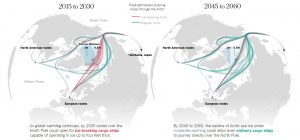President Donald Trump has indicated an intention to withdraw the US from the Paris accord on climate change.
His announcement, made on Thursday 1 June, means the US will no longer recognise the collective aim of mitigating the impact of climate change.
The University of Reading is a world leader in climate science and research into the physical, economic and social impacts of climate change, helping to provide the strong scientific evidence upon which the Paris agreement was based.
Here, we look at some of this celebrated research, which remains central to the aims of the 194 countries that remain signed up to the Paris Agreement.
The UN’s landmark IPCC report on climate change in 2013 showed the world is heating up, and human activity is to blame for most of the change. Some 17 of the University of Reading’s climate scientists were among hundreds contributing to the report. Professor Rowan Sutton was a co-ordinating lead author. He said: “Leaving the issue of climate change for future generations to deal with is a phenomenally high-risk option.”
Reaction from University of Reading academics to Trump’s announcement on Paris Agreement
One of the aims of the Paris Agreement was to keep global temperature rise to below 2C above pre-industrial levels, and endeavour to keep it below 1.5C. Climate change is already having an impact on the world – and left unchecked, will lead to even greater impacts on people in the future.
University of Reading research has shown the influence of climate change on:
- The US economy: Allowing worst impacts of climate change to occur would expose more Americans to damaging floods, heatwaves, droughts, and degrade farmland. These diagrams show how heatwaves, flooding, water stress and crop decline will affect more of us than ever if global temperature rise higher than 2C (Professor Nigel Arnell / Walker Institute)
- Aviation: Climate change will impact aviation by making affecting the jet stream – making flights longer and bumpier (Professor Paul Williams). More recent research by Professor Williams has revealed there could be a 149% increase in severe turbulence in the future
- Food security: Extreme heat will hit production of staple crops, such as maize (Professor Ed Hawkins)
- Wildlife: Research published in Science reveals changing climate is even more damaging to bumblebees than insecticides. (Professor Simon Potts)
- Sea levels: Sea levels are steadily rising as a result of melting ice sheets and warmer, expanding water as the oceans heat up. (Professor Jonathan Gregory)
- The Arctic: It’s just a question of when, not if, sea ice will disappear from the Arctic (Professor Ed Hawkins)
- Heat waves: Extreme heat events will continue to increase in frequency (Professor Rowan Sutton)
- Flash floods: Warmer air means the atmosphere can hold more moisture – meaning more sudden, unpredictable downpours and summer flash floods in places like the UK (Professor Hannah Cloke / Dr Sarah Dance / Dr Rob Thompson)
Read more: What is wrong with Donal Trump’s denial of Climate Change?
- Mass migration: Climate change influences migration, but patterns are difficult to predict (Dr Alex Arnall)
- Melting ice: Melting Arctic sea ice is 70-95% caused by greenhouse gas emissions (Dr Jonny Day)
- Development: Climate justice is key to ensuring success of Paris Agreement (Professor Chuks Okereke)
- Shipping: Research showing ships could sail directly across the North Pole by the middle of the century as ice disappears featured on the front page of the New York Times earlier this year (Dr Nathanael Melia / Professor Keith Haines / Professor Ed Hawkins)

